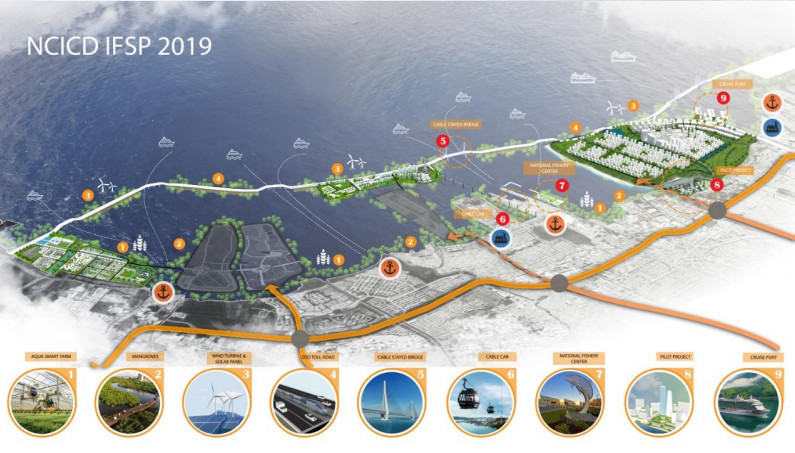Blue economy not as sustainable as touted: Researchers
Change Size

D
espite being hailed as a sustainable way of reaping benefits from the ocean ecosystem, implementation of the “blue economy” in Indonesia still runs the risk of displacing local communities and livelihoods, researchers have warned.
As an expansion of the green economy, the blue economy concept introduced in 2012 emphasizes conservation and the sustainable management of oceans. It promotes the use of marine resources for economic growth, improvement of people’s welfare and sustainable use of the sea.
The troubles of implementing the blue economy in Indonesia are part of findings by Indian activists and scholars under the Social Need Education and Human Awareness (SNEHA) group, which conducted field studies nearly a year ago in various parts of Indonesia.
They visited at least five coastal communities across the archipelago between Nov. 11 and Nov. 18 last year to gauge the implementation of blue economy strategies in the country and their impact on local populations.
These include Pari Island in Jakarta’s Thousand Islands regency and the Muara Angke fishing community in North Jakarta; Central Java coastal communities in Bandungharjo subdistrict in Jepara regency and Sayung district in Demak regency, as well as those living on the Karimunjawa and Parang islands; and the Demak-Based Indonesian Fisherwomen’s Association (PPNI).
One of the researchers, A. Gandimathi, noted that while Indonesia had promoted the Global Maritime Fulcrum as one of its key policies since 2014, problems with implementation could prove disastrous for the environment and the coastal communities that rely on it.
Questions arose, for instance, over the Giant Seawall Project on Jakarta’s coast, which claims to prevent the capital from sinking any further.
“What could be the implications of this project? It would be a development-induced disaster,” Gandimathi said during an online discussion last week.
The seawall project has triggered its fair share of controversy, with experts saying that the government should instead focus on preventing Jakarta from sinking further by stopping groundwater extraction. After long discussions between water management experts from Indonesia and abroad, most experts agreed that groundwater extraction was the main cause of the sinking.
“Indonesia is already prone to tsunamis, being [situated] in a volcanic region as well as on tectonic plates. It is a disaster-prone zone [that could be made worse by] the project,” she said.
Should the project continue, it could increase marine pollution causing biodiversity loss, as well as erosion and inundation. As a result, fishing communities living on the coast would be forced to migrate inland, losing their homes and livelihoods at the same time, the researcher said.
Meanwhile, when locals tried to resist, the state responded with repression. “People who have enjoyed their right to depend on coastal resources are being displaced because of land grabbing in the name of tourism,” she said.
One example is Pari Island, which is included as part of a wider state tourism project in the Thousand Islands, where there is an ongoing dispute between locals and PT Bumi Pari Asri on the privatization of the island.
Responding to the study, People's Coalition for Fisheries Justice (KIARA) secretary-general Susan Herawati complained that Indonesia was merely following trends pushed by the Organization for Economic Cooperation and Development (OECD).
The OECD said that by 2030, the ocean would become central to economic growth.
“The problem is that this economic [bias] doesn’t consider the people’s [livelihoods], especially fishing communities as holders of the right to maintain and manage ocean resources,” Susan said, noting that the government still promoted economic growth based on extractive activities.
The KIARA executive said there were three aspects of the blue economy recognized by the OECD – tourism, mining and port development – that could prove detrimental to the environment and fishing communities.
“We see this more as a carbon threat that doesn’t consider the needs of the traditional and social aspects managed by local communities,” she said.
Meanwhile, Indonesia Forum for the Environment (Walhi) director Nur Hidayati said the implementation of the blue economy proved that the government put too much emphasis on economic growth as a marker for success in development.
“Many critics have already stressed that economic growth is a flawed indicator – it fails to pick up on the nuances of real situations by exacerbating inequality, violence and discrimination,” she said.
As such, Nur called on the government to follow internationally accepted and ratified standards and obligations on environmental and community protections.
President Joko “Jokowi” Widodo launched the Global Maritime Fulcrum vision of Indonesia at the East Asia Summit in 2014, which promotes the development of its marine and coastal areas, among other measures.
Indonesia’s ocean ecosystems have tremendous economic potential that has yet to be fully harnessed, according to the 2019 World Bank report, “Oceans of Opportunity”.
Its fisheries sector is the second-largest in the world and plays a critical role providing food security and employment. Indonesia’s tourist sector benefits heavily from the country’s world-class marine and coastal (MAC) assets, with MAC tourism being a key driver of visitor growth.
However, poor management and marine debris threaten these priceless national assets, the report said.









